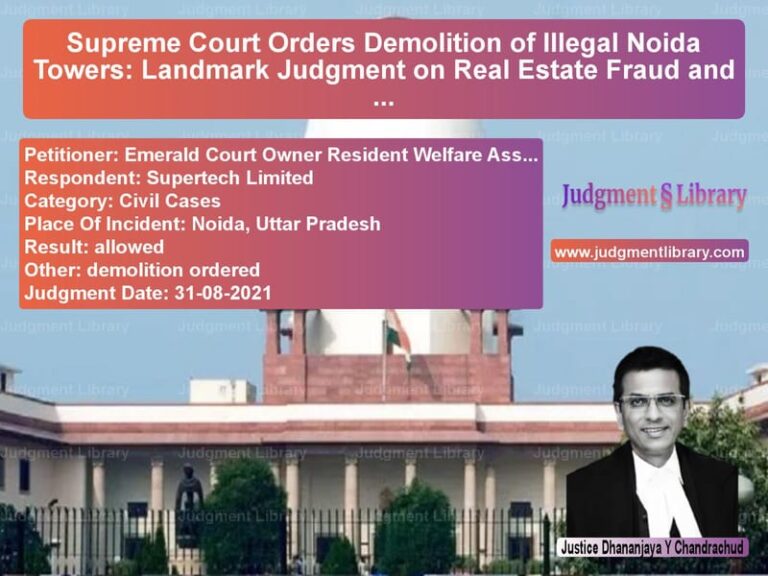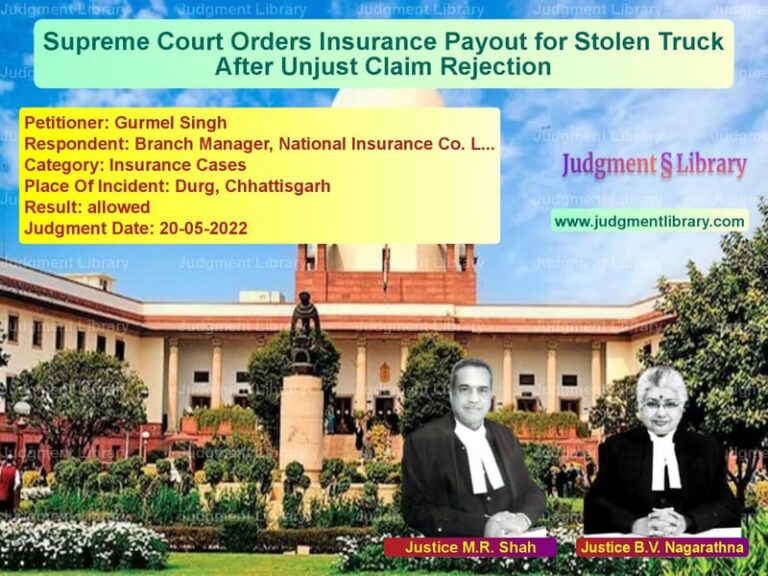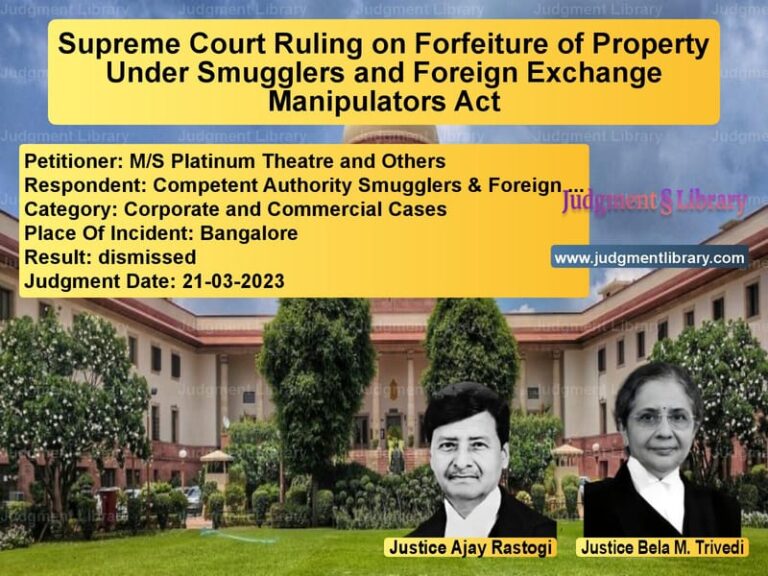Understanding Limitation in Property Disputes: Supreme Court’s Analysis on Rejection of Plaint
The legal dispute in Raghwendra Sharan Singh vs. Ram Prasanna Singh (Dead) by LRs revolved around the interpretation of limitation laws in civil suits, particularly when a plaint can be rejected under Order 7 Rule 11(d) of the Code of Civil Procedure (CPC). The Supreme Court of India analyzed whether a delay of over two decades in challenging a registered gift deed barred the suit under the Limitation Act, 1963. This case underscores the critical importance of filing claims within prescribed time limits and the judiciary’s role in preventing vexatious litigation.
The matter originated when the respondent, the original plaintiff, filed a suit challenging a gift deed executed in 1981. The appellant, Raghwendra Sharan Singh, contended that the suit was time-barred under Article 59 of the Limitation Act, which prescribes a limitation period of three years. The trial court and the Patna High Court rejected the application for dismissal, leading to an appeal before the Supreme Court.
Background of the Case
The dispute traces back to the year 1965, when the original plaintiff and his brother jointly purchased the disputed property. Subsequently, in 1981, the plaintiff and his brother executed a registered gift deed in favor of the appellant, transferring possession and title. For over two decades, no challenge was made to this deed.
In 2001, the appellant filed a partition suit against his brothers, in which the respondent was also named as a defendant. Following this, the respondent initiated Title Suit No. 19 of 2003, claiming that the gift deed was a sham transaction and did not confer valid title or possession. He sought a declaration that the deed was not binding and requested recovery of possession.
Legal Issues Raised
- Whether the suit was barred by limitation under Article 59 of the Limitation Act, which mandates a three-year period for challenging a deed.
- Whether the respondent deliberately avoided seeking relief for setting aside the gift deed to evade limitation restrictions.
- Whether the trial court and High Court erred in rejecting the appellant’s application under Order 7 Rule 11 CPC.
- Whether a question of limitation can be decided at the preliminary stage without trial.
Arguments by the Appellant
The appellant, Raghwendra Sharan Singh, argued that the suit was hopelessly time-barred. His counsel made the following submissions:
- The registered gift deed was executed in 1981, and no objections were raised for over 22 years.
- Under Article 59 of the Limitation Act, a suit for setting aside an instrument must be filed within three years from the date of its execution.
- The respondent cleverly drafted the plaint to avoid seeking relief for quashing the gift deed, knowing that such a claim would be barred by limitation.
- The trial court and the High Court failed to appreciate that the issue of limitation was apparent from the plaint itself.
- By 2001, the respondent was aware of the gift deed, yet he filed the suit in 2003, making it inexcusably delayed.
- The courts must prevent frivolous litigation by applying the principle laid down in T. Arivandandam v. T.V. Satyapal (1977) 4 SCC 467, which states that vexatious suits should be rejected at the threshold.
Arguments by the Respondent
The respondent, the original plaintiff, opposed the appeal, arguing:
- Limitation is a mixed question of fact and law and should be decided only after leading evidence.
- The plaintiff allegedly came to know about the gift deed only in 2001 when the appellant claimed title over the property in the partition suit.
- Under Order 7 Rule 11 CPC, courts must consider only the plaint and not the defenses raised by the defendant.
- The plaintiff had continuous possession, which justified his claim for ownership.
Supreme Court’s Ruling
The Supreme Court allowed the appeal and quashed the orders of the High Court and the trial court, rejecting the plaint under Order 7 Rule 11(d) CPC. The key findings were:
- The gift deed was a registered document executed in 1981. The plaintiff, being one of the executants, could not claim ignorance of its existence.
- The limitation period for challenging such a document was three years, and the suit filed in 2003 was far beyond this period.
- The courts must scrutinize the plaint meaningfully to prevent vexatious litigation.
- When a suit is barred by law, it must be rejected at the preliminary stage, without requiring a full-fledged trial.
- The decision in T. Arivandandam v. T.V. Satyapal was reaffirmed, emphasizing that frivolous suits must be “nipped in the bud.”
Key Takeaways from the Judgment
- Parties must file suits within the prescribed limitation period, or they risk rejection under Order 7 Rule 11.
- Clever drafting cannot circumvent limitation laws.
- Courts have the power to dismiss time-barred claims at the outset to prevent unnecessary litigation.
- Registered documents carry a presumption of validity unless challenged within the statutory period.
Conclusion
The Supreme Court’s judgment in this case reaffirms the fundamental principle of limitation in civil litigation. It underscores the importance of timely legal action and clarifies that courts must exercise their power under Order 7 Rule 11 CPC to reject suits that are manifestly time-barred.
This ruling serves as a precedent for future cases involving delayed challenges to registered documents. It ensures that litigation is not prolonged unnecessarily and that legal remedies are pursued within a reasonable timeframe.
Petitioner Name: Raghwendra Sharan Singh.Respondent Name: Ram Prasanna Singh (Dead) by LRs.Judgment By: Justice L. Nageswara Rao, Justice M. R. Shah.Place Of Incident: Patna.Judgment Date: 13-03-2019.
Don’t miss out on the full details! Download the complete judgment in PDF format below and gain valuable insights instantly!
Download Judgment: Raghwendra Sharan Si vs Ram Prasanna Singh ( Supreme Court of India Judgment Dated 13-03-2019.pdf
Direct Downlaod Judgment: Direct downlaod this Judgment
See all petitions in Property Disputes
See all petitions in Specific Performance
See all petitions in Damages and Compensation
See all petitions in Judgment by L. Nageswara Rao
See all petitions in Judgment by Mukeshkumar Rasikbhai Shah
See all petitions in allowed
See all petitions in Quashed
See all petitions in supreme court of India judgments March 2019
See all petitions in 2019 judgments
See all posts in Civil Cases Category
See all allowed petitions in Civil Cases Category
See all Dismissed petitions in Civil Cases Category
See all partially allowed petitions in Civil Cases Category







